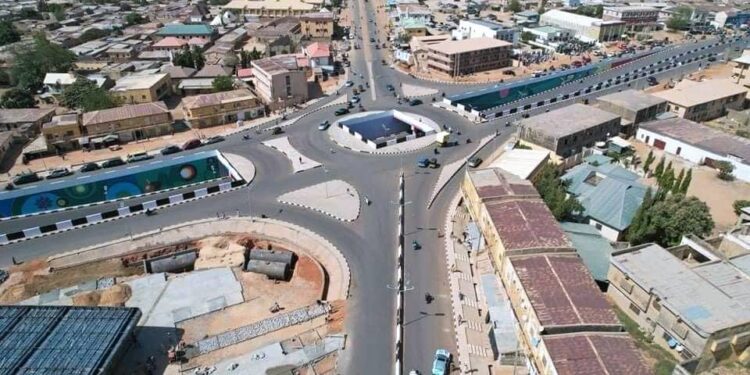Nigeria’s ten least indebted states owed a combined total of N191.8 billion in domestic debts in Q1 2025, according to the Debt Management Office (DMO).
This represents 4.96% of the country’s total sub-national debt during the quarter.
In the period under review, Jigawa emerged as the state with the lowest sub-national debt in the federation.
On a year-on-year basis, sub-national debt among these states declined by 4.91%, from N4.07 trillion in Q1 2024 to N3.87 trillion in Q1 2025. States such as Anambra, Borno, and Kaduna also recorded reductions in their debt profiles over the same period.
The latest DMO report highlights a reshuffling in Nigeria’s sub-national debt landscape, influenced by fiscal constraints, infrastructure development ambitions, shifts in oil revenue, and tighter federal allocations.
This analysis examines the debt trends of the top 10 least indebted states.
10. Anambra – N28.2 billion
Anambra state’s domestic debt stock reduced from N34.43 billion in Q1 2024 to N28.2 billion in Q1 2025. The state accounted for 14.71% of the total debt of the 10 least indebted states and 0.73% of the total subnational debts in Q1 2025.
The state’s debt profile is attributed to some of the government’s conservative borrowing policies. The state also continues to attract direct investments into its industrial and tourism sectors, potentially offsetting the need for debt-heavy budgets.
In March 2025, Anambra State Governor, Professor Chukwuma Soludo, revealed that his administration opted out of an existing World Bank loan agreement to prevent the state from falling into a “debt overhang.”
“I reviewed the loan terms and found them unsustainable. It would have been easy to continue with it since future generations would bear the burden, but based on those terms, it was a bad deal for Anambra.
“Last year, N438bn was distributed among 35 states, and Anambra was the only one that did not accept it. I need money, but I cannot borrow my state into slavery,” Soludo added.
In December 2024, the Anambra State House of Assembly passed the N607 billion 2025 budget into law.
The budget projected and estimated recurrent N139.5 billion, representing 23 percent, while N407.5 billion, representing 77 percent, would be for capital expenditure.
9. Borno – N25.1 billion
The Borno state domestic debt stock fell from N36.89 billion to N25.1 billion year-on-year. This represents a 31.96% reduction in the period under review.
This state’s significant decline is driven by successful debt renegotiations, better cash management, and fewer new capital commitments.
Also, key to this development is the increase in FAAC allocations and IGR of the state.
The Borno government set a N25 billion internally generated revenue (IGR) target 2025, as against the N19 billion for last year.
The chairman of the Borno State Internal Revenue Service, Bello Ibrahim, announced that the agency had already generated over N18 billion as of September, adding that by the end of November, it would have surpassed its 2024 projections of N19 billion.
“We are looking at generating N25 billion in 2025, God willing. We will intensify efforts to leverage the little peace we are gaining in the state and expand the scope of our collections,” said Ibrahim.
While presenting its N584 billion budget proposal for the 2025 fiscal year to the State House of Assembly in December 2024, the governor of Borno state, Babagana Zulum, said that the budget is projected to be financed through recurrent revenue of N279.51 billion, which includes Federation Account Allocation Committee receipts of N249.42 billion and Internally Generated Revenue of N30.09 billion.
The state plans to invest heavily in agriculture to enhance food security and job creation through provisions for irrigation systems, fertilizers, and the cultivation of over 100,000 hectares of farmland.
The government also intends to rehabilitate the College of Agriculture, which was damaged by floods, and upgrade facilities at Ramat Polytechnic and the College of Education, Waka-Biu.
Also, the Borno State Government allocated N7.46 billion for the reintegration, disarmament, and demobilisation of repentant Boko Haram members in its 2025 budget.
Other key capital projects include erosion and flood control (N15 billion), purchase of grains for buffer stock across the state (N10.24 billion), hospital construction (N10 billion), scholarships for indigenes (N9.3 billion), rehabilitation of Maiduguri Hotels and other infrastructure (N8 billion), and equipping the state university teaching hospital (N8 billion).
The Kaduna state domestic debt profile reduced from N29.38 billion in Q1 2024 to N25.01 billion in Q1 2025. This shows a 14.87% year-on-year reduction in the state debt stock.
This development can be attributed to a lot of factors, key among which is an increase in IGR.
In March 2025, the Kaduna State Internal Revenue Service (KADIRS) announced that it collected a total of N14.16 billion in IGR in January and February.
Also, recently, the Kaduna state government says it recorded N91.23 billion in total revenue in the first half (H1) of 2025.
According to the commissioner for planning and budget, Mukhtar Ahmed during a stakeholders’ engagement on the state’s 2025 budget implementation report for the first and second quarters, he said as at the end of the second quarter of 2025, “Kaduna state recorded an actual total revenue of N91,232,312,135.21, while year-to-date (YTD) total expenditure stood at N89,202,307,325.45.”
“These figures contributed to the cumulative half-year budget performance of N340,296,244,691.21 for revenue and N208,760,832,569.21 for expenditure, representing 43.1 percent and 26.4 percent performance against the 2025 original budget, respectively,” he added.
Recently, the state secured a $25.35 million concessionary loan from the Kuwait Fund for Arab Economic Development to support a landmark education initiative aimed at reducing the number of out-of-school children in Kaduna.
The programme is expected to enrol over 100,000 children, build or upgrade more than 200 schools, and improve the learning environment and teacher capacity across underserved communities in the state.
7. Nasarawa – N24.73 billion
Unlike many states on this list, Nasarawa State’s domestic debt profile increased from N23.76 billion in Q1 2024 to N24.73 billion in Q1 2025. This represents a 4.08% year-on-year increase.
The Governor of Nasarawa State, Abdullahi Sule, has attributed the increasing debt profile in the state to challenging security concerns, inherited debt, and infrastructural deficits.
He disclosed that the state had settled debts amounting to over N57 billion, which included bailout funds, budget support, and the N10 billion project support facility granted to each state before his administration took office.
Also, the Nasarawa state government had provided an extra N137 million from state coffers to clear outstanding obligations to contractors as part of ensuring infrastructural developments in the state.
6. Katsina – N23.3 billion
The Katsina state domestic debt stock reduced from N38.06 billion in Q1 2024 to N23.3 billion in Q1 2025. This represents a 38.77% year-on-year decrease.
The state, in recent months, has used a significant amount of its budget for debt servicing. According to the Katsina State Commissioner for Budget and Economic Planning, Bello Kagara, the sum of N20.4 billion was allocated for debt servicing in the 2025 budget of N628.2 billion.
The 2025 budget comprises recurrent expenditure of N157.97 billion, broken down as follows: personnel cost and salaries, N51.69 billion, and pension and gratuity, N15.42 billion.
Also, the state’s IGR has increased in recent months. The state’s IGR increased from N700 million to N1.856 billion in July, according to the Executive Chairman of the state’s Internal Revenue Service, Alhaji Isyaku Mohammed.
This is largely due to the introduction of the central billing, which was aimed at addressing leakage in revenue collection.
While there has been no evidence of the state requesting fresh loans, the Governor Dikko Radda-led government has been repaying subsisting loans.
5. Kogi – N20.4 billion
Kogi state’s domestic debt profile dropped from N38.55 billion in Q1 2024 to N20.4 billion in Q1 2025, according to DMO data.
The data shows a 47.08% year-on-year decrease in the period under review.
In June 2025, the Kogi State Government announced it had liquidated a total debt of N98.8bn in 15 months.
The Commissioner for Finance and Economic Planning, Ashiru Idris, said, “So far, this administration under the leadership of Alhaji Usman Ododo has liquidated a total of N98.8bn inherited from the previous administration of Alhaji Ibrahim Idris and the N50bn salary bailout granted Capt Idris Wada administration.”
The state’s debt profile is attributed to some of the government’s debt management policies. The state also continues to attract direct investments to critical sectors to potentially offset the need for debt-heavy budgets
A key factor in the reduction of the state’s debt profile is its increased revenue generation drive.
Kogi State Governor, Alhaji Ahmed Usman Ododo, FCA, had set a monthly Internally Generated Revenue (IGR) target of N6 billion to sustain the state’s financial independence and ensure prompt salary payments for civil servants.
Also, Kogi State’s annual IGR as of December 2024 stood at approximately N27.73 billion, averaging N2.3 billion per month, a significant improvement from N6.5 billion annually in 2015.
4. Ebonyi – N17.1 billion
Ebonyi state’s domestic debt stock dropped from N22.22 billion in Q1 2024 to N17.1 billion in Q1 2025.
According to DMO data, this represents a 23.03% year-on-year decrease in the period under review.
The state’s 2024 budget performance report shows that during the 4th quarter, the total revenue performance, encompassing Internally Generated Revenue (IGR), Federation Account Allocation Committee (FAAC) receipts, and Capital Receipts, reached 84.7% of the budgeted revenue, including the opening balance.
The report also shows the state achieved 78.1% of its budgeted IGR by the end of Q4 2024, reflecting a 21.9% shortfall. However, this marks a significant improvement from Q3’s performance of 62.4%, representing a 15.7% increase.
Out of the budgeted capital expenditure of N307.04 billion for 2024, the state spent N126.56 billion in Q4, achieving 41% of the annual budget.
The state’s Debt Sustainability Analysis shows that a huge proportion of revenue went into debt servicing.
3. Kebbi – N15.1 billion
The DMO data shows that Kebbi state’s domestic debt stock fell from N17.06 billion in Q1 2024 to N15.1 billion in Q1 2025.
This represents a 11.49% year-on-year decrease in the period under review.
Most of the state’s debts went into infrastructural projects, especially roads and aviation.
The Minister of State for Works, Engr. Abubakar Aliyu has stated that the FG will refund the monies spent on the Federal Government’s road projects by the state government.
The State was claiming over N2bn reimbursement for the 87km long Dabai-Mahuta-Koko road.
Recently, the Senate approved over N15.1 billion as a promissory note refund to Kebbi for construction works on the Sir Ahmadu Bello International Airport, Birnin-Kebbi.
According to the state’s 2024 budget performance report, the state achieved 68.2% of its recurrent revenue target. The state also made efforts to enhance revenue generation, including expanding the IGR base, curbing revenue leakages, and fostering stakeholder engagement to secure additional aid and grants.
The state prioritises capital investments for its developmental goals, focusing on key sectors such as education, healthcare, and infrastructure. The total capital expenditure budget for 2024 was N203.5 billion, inclusive of supplementary provisions. In Q4, the state expended N67.4 billion on various capital projects.
2. Ondo – N11.8 billion
The Ondo state’s domestic debt profile reduced from N16.4 billion in Q1 2024 to N11.8 billion in Q1 2025.
This shows a 28.05% year-on-year decrease, according to DMO data.
This is largely due to the Governor of Ondo State, Lucky Aiyedatiwa’s administration’s commitment to implementing wide-ranging cost-control measures and debt management strategies.
Also, the Ondo State Internal Revenue Service (ODIRS) has recently generated N28.1 billion during the first six months of 2025.
1. Jigawa – N1.06 billion
Jigawa state is Nigeria’s least indebted state in the domestic debt category, as of Q1 2025. The state’s domestic debt profile reduced from N2.07 billion in Q1 2024 to N1.06 billion in Q1 2025.
This represents a 48.79% year-on-year decrease. This is also the highest year-on-year decrease in debt stock in the year under review.
The state’s debt profile is attributed to some of the government’s disciplined borrowing policies.
The state also continues to place emphasis on revenue generation to fund infrastructure and other capital projects.
Jigawa State generated over N8 billion in internally generated revenue (IGR) in the first quarter of 2025.
This is largely due to the favorable investment environment, as well as the adoption of modern technologies and innovative strategies.
Stay ahead with the latest updates!
Join The Podium Media on WhatsApp for real-time news alerts, breaking stories, and exclusive content delivered straight to your phone. Don’t miss a headline — subscribe now!
Chat with Us on WhatsApp







